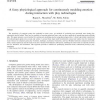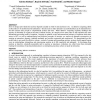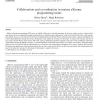32 search results - page 4 / 7 » ijmms 2007 |
IJMMS
2007
13 years 9 months ago
2007
Much has been written of the facilities for ontology building and reasoning offered for ontologies expressed in the Web Ontology Language (OWL). Less has been written about how th...
IJMMS
2007
13 years 9 months ago
2007
The popularity of computer games has exploded in recent years, yet methods of evaluating user emotional state during play experiences lag far behind. There are few methods of asse...
IJMMS
2007
13 years 9 months ago
2007
How we design and evaluate for emotions depends crucially on what we take emotions to be. In affective computing, affect is often taken to be another kind of information - discret...
IJMMS
2008
13 years 9 months ago
2008
This work examines whether it is possible to compensate for the loss of vestibular information that is usually felt by drivers of modern cars when negotiating bends and which is a...
IJMMS
2008
13 years 9 months ago
2008
Mature eXtreme programming (XP) teams are highly collaborative and self-organising. In previous studies, we have observed that these teams rely on two apparently simple mechanisms...



